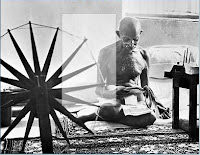 Mahatma Gandhi understood meaning of Charakha the way entirely different from what we practice today. Charakha had been a symbol of offering work in every person's home. Charakha offered work to every person. Charakha ensured that every one is employed. Charakha showed self-sufficiency.
Mahatma Gandhi understood meaning of Charakha the way entirely different from what we practice today. Charakha had been a symbol of offering work in every person's home. Charakha offered work to every person. Charakha ensured that every one is employed. Charakha showed self-sufficiency.
Charakha never meant to him as an article or tool, which in totality should be used, for self-sufficiency or earning livelihood. During his time that had been the primary, simplest, low cost machine which any one in India of his time could master. There is a need to understand this, modify our strategy, and adopt new tools with sole aim of providing adequate work to every hand in his/her own place.
As on today, we have vast resources in terms of machines, intellectual work force and natural resources. Charakha need to be replaced with what is available today. There is absolutely no need to encourage Khadi. Khadi need not be a symbol. There is a need to find new Charakha in present society. It need not be a single solution. It need not be a simple machine. India has trained work force. Today it is not difficult to find a person even in village who can operate sophisticated machines. In certain cases may be little training is needed. There definitely is appreciable improvement in communication. There is no need to collect persons in certain place and offer them employment. It is possible to organise industry considering transport of raw material and finished goods rather than migration of population.
In order to stop flow of population towards cities and towns, jobs need to be created in villages. With improved means of communication, this is not a big challenge. It is no necessary that the jobs be agro based, although it is desirable. Manufacturers need to be encouraged to establish small workshops in villages. Such workshops may not be owned by the manufacturers. There is no need of Industrial Estate. There is a need for Industrial electricity feeder in all villages. Certainly, manufacturers must guide locals to establish workshops, offer necessary training, and give full support in providing raw material and buying processed goods. Research, marketing, testing and assembly units still may be in cities as off now. Thought behind this is labour oriented work should be done in villages and sophisticated work in cities and towns, to begin with. In days to come more and more responsibility may be transferred to village level activities.
There is no necessity to establish industrial zones in villages. Let people operate from there own home. With time, it would be possible for villagers to construct their own workshops in zone. They would definitely make surpluses to fund their new ventures. The process need to be given a deep thought and organise in a time frame as may be found practicable. Participation of manufacturers is a key activity.
This is not some thing new. This is being practiced by so-called developed nations. These nations have stopped encouraging migration of persons from other nations. In fact, they have made it more difficult. They have found a new solution in out sourcing in developing nations. Medical transcription, Call centres are the examples. Many industries where high expenditure is involved in manpower and environment protection are being established in developing nations. This is not only to take advantage of cheaper manpower in monthly salaries but also imagine there expenditure and risk if they were to allow foreigners to settle down in their country. Consider the saving in providing necessities and amenities to work force migrating to cities and towns. Consider expenditure on transportation. I am confident that the system of decentralising industry in villages would certainly be an economical solution for progress and prosperity.
Mahatma Gandhi probably may be expecting this as a solution to large-scale migration of population in his thought of wide use of Charakha
Mahatma Gandhi probably may be expecting this as a solution to large-scale migration of population in his thought of wide use of Charakha












No comments:
Post a Comment